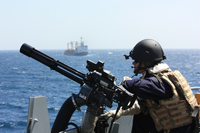The battle against piracy off the coast of Somalia is not going well, with pirates continuing to attack and seize vessels and, in some cases, becoming more violent. The recent deaths of four American missionaries at the hands of pirates served to highlight the helplessness of the world navies gathered in the Gulf of Aden: Four American warships, including the USS Enterprise, monitored the situation, but none were able to prevent the tragedy. While the multinational naval flotilla -- primarily CTF-151, but including some other navies -- off Somalia has seen some notable successes, it has not defeated the pirates or changed the circumstances under which piracy has flourished. It is time for the world's maritime powers to rethink their approach to piracy.
That anti-piracy efforts have failed is now recognized at the highest levels of government. Secretary of State Hillary Clinton recently reported to Congress that "the naval ships that have been involved from . . . more than 20 nations just have not been willing to really put themselves out. They're happy to patrol, and they're happy to . . . count themselves as part of the coalition. But when push comes to shove, they're not really producing." Sen. Mark Kirk, a former Naval reservist, proposed a set of tactical and legal reforms that would improve the flotilla's ability to make contact with pirates -- and to defeat them after contact is made.
But seeking to strengthen the flotilla's impact by loosening its rules of engagement on the high seas increases the chances that civilians will be killed and may pose a legal hazard. Also, pirates may respond to more aggressive ROEs by becoming more violent themselves. Finally, simply making adjustments to the way in which the flotilla operates might be missing the point: The flotilla just might not be able to solve the problem.

